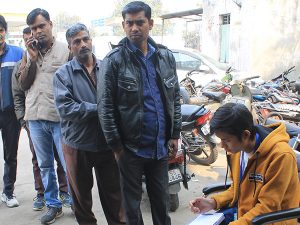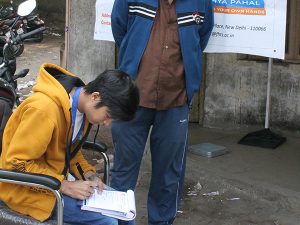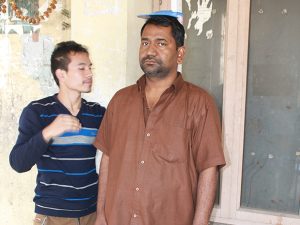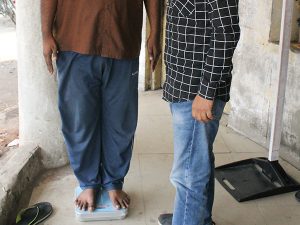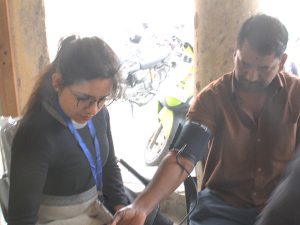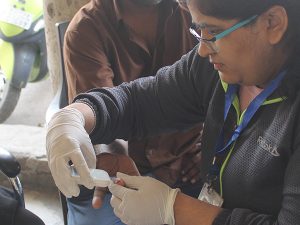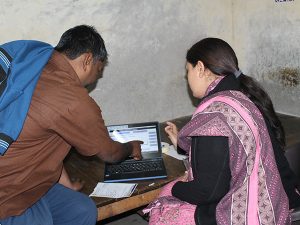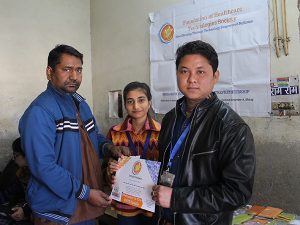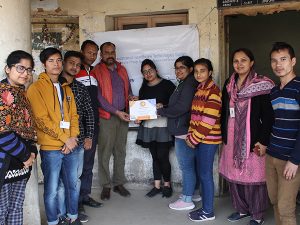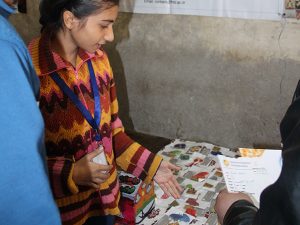| Location | Bus Depot, Seemapuri, Dilshad Garden, New Delhi |
| Dates | February 7, 2020 (10:30 am) - February 7, 2020 (3:45 pm) |
| Total Beneficiaries | 79 |
| Female Beneficiaries | 14 |
| Total Participants | 66 |
| Female Participants | 13 |
Conclusion
A total of 79 beneficiaries attended the Swasthya Pahal camp organised on 7th February 2020 at Bus Depot, Seemapuri, Dilshad Garden, New Delhi. Nearly three fourths of the beneficiaries (73.4%) had hypertension (i.e. blood pressure >120mm/Hg) and more than a tenth of the beneficiaries (12.6%) had high random blood sugar (> 140mg/dL). Forty percent beneficiaries were overweight/obese (i.e. Body Mass Index > 24.9 kg/m2) and only one third of the beneficiaries (32.9%) were engaged in regular physical activity i.e. at least 4 times in a week with higher proportion of males as compared to females. Some of the beneficiaries reported lack of time as the main barrier for not being able to exercise regularly.
More than one third of the beneficiaries (35.4%) consumed alcohol and same number of beneficiaries were smoking bidhi or cigarette, though the quantity and frequency of smoking and drinking alcohol varied widely among the beneficiaries. All the beneficiaries found the swasthya pahal initiative useful and very helpful.
Comments
- One of the beneficiaries attended the Swasthya pahal conducted in this place before and he reduced the smoking to half after attending the Swasthya Pahal. He said he will quit it entirely.
- In today’s Swasthya Pahal beneficiaries were receptive to the counselling given.
- They found it very useful and gave comments such as “very good” and “excellent”.
- Most of beneficiaries were in contemplative stage of adopting healthy behaviors while some were in action stage.
Misconceptions among beneficiaries observed during the camp:
- There was a misconception among most of the beneficiaries that Jaggery consumption is not harmful for a person with diabetes and hence most of the diabetics were consuming jaggery regularly without any restrictions.
- Another misconception was about Iodine salt. In their opinion Iodine is not good for health so they were not consuming Iodized salt.
Details of RISE products sold during the camp: Sixty six males and 13 females viewed RISE products on the day. They mostly viewed earrings, pouches and t-shirts.
RISE (Research, Innovation, Skills and Entrepreneurship), a collaborative Women Empowerment initiative of FHTS and P.H.RISE, USA, aims to Educate, Employ and Empower women, by providing them skills in research, innovation and entrepreneurship. Under RISE initiative, our aim is to create 500 sustained employment for urban slum girls. We aim to provide platform to urban slum women and girls to not only be independent but also support their families, nurture their dreams, create their own identity and be a source of inspiration to many.
Both the Swasthya Pahal and RISE initiatives, utilize SMAART™ framework conceptualized by Dr. Ashish Joshi presently Senior Associate Dean of CUNY Graduate School of Public Health and Health Policy, New York and the founder of Foundation of Healthcare Technologies Society (FHTS). Know more about his vision at ashishjoshi.me.


